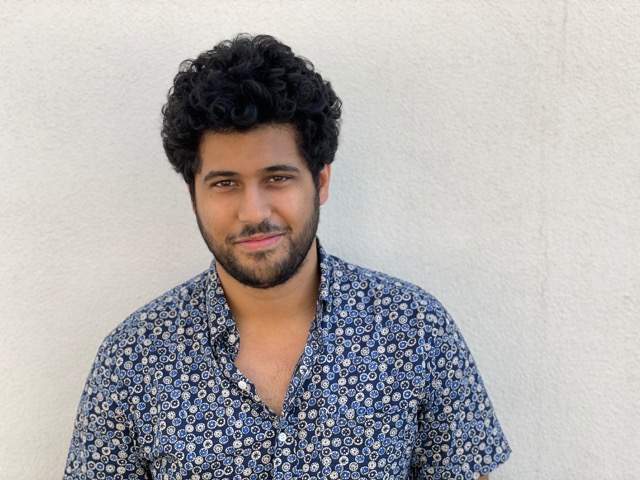
When watching a dramatic film or TV series, it’s most likely the struggle and perseverance of the main character which leads to your interest and commitment in seeing the story through. We all see something of ourselves and our own personal trials in these tales. However, most of us never stop to think about the fact that those whom make these productions for us have their own personal iteration of these tales simply through the experience of making them.
It’s a major feat to get any quality film made these days, as Youssef Gouda, writer of the award-winning film Jurassic Punk will confirm. There’s a great deal to the filmmaking process and its outcome that the public never glimpses. Youssef had the story of Jurassic Punk with him since his mid-teen years growing up in Cairo. He’d always hoped that the film and its central character Danny Brooklyn would make it to life in a Hollywood film someday even though it seemed inconceivable for a young aspiring writer raised in Egypt.
Mr. Gouda’s path to realizing Jurassic Punk decades later is as populated with impediments as that of Danny’s musical odyssey. Vision and reality can be combatants or brothers-in-arms but don’t often coexist in the world of art. If the Punk ethos is a fierce commitment to doing things guided by your own north star, Youssef’s course mirrors that of Danny Brooklyn’s, as well as his disenchantment with the dilution of art.
When we meet Danny Brooklyn (played by Nic D’Avirro of the Daytime Emmy Award Winning Series The Bold and the Beautiful) he is in a retirement home, estranged from his daughter Sam (Taylor Scorse). As a young man, Danny fronted a punk band in the 70’s. He was such a true-believer that his anarchist code alienated him from his fellow band members. The group ditched the singer and moved on to become one of the most successful bands of the 1980s.
The now elderly Danny discovers that his former group is embarking on a reunion tour and it sparks his long dormant rebellious need to even the scales by crashing the opening night of the tour. Jurassic Punk begins as a tale of vengeance but recalibrates to focus on forgiveness and redemption, primarily in parental terms. The angst of young Danny (magnificently performed by Phillip Alexander of 14 Primetime Emmy Award Winning Series The Mandalorian on Disney+) still exists in the modern day iteration but he must question whether his nature is worth the cost it extracts.
One might ask how an Egyptian teenager became so connected to the punk ethos that is rooted in the UK and US. There is punk that is fashion and then there’s the authentic DNA of punk which is a counter balance to oppressive rule. True punk is less about spiked hair and slam dancing than it is about a positive release of frustration.
Youssef reveals, “At age 15, with the Egyptian Revolution happening outside my window, I was enamored with Punk music. Anarchy and rebellion was it. It was inspiring and I drenched myself in that era of social unrest. There is an internal very youthful desire to stick your middle finger up at authority. It was the guided principle behind Punk before it became a money making genre like everything else. Before, music was about talent and skill.
Most of the Punk rockers of the time weren’t brilliant musicians, but they had attitude, something to say and were loud. Really fucking loud. And so I wanted to write something about Punk and that’s when Danny Brooklyn came crashing in. Since Punk is an inherently youthful concept, rebellion is constantly something they say you’re supposed to grow out of. The idea of a Punk rocker who refused to grow up, was inherently funny and sad to me. He struck me as the loneliest man in the world at the time.”
Jurassic Punk was many years in the making. Though he received Best Writer awards for his screenplay of this film (USC First Look Awards), Youssef toiled unsuccessfully for years trying to bring it to the screen. While the film has been lauded, Mr. Gouda concedes that he’s not content with the final form it reached; a notably punk perspective.
He confesses, “The experience making it was largely unpleasant and frankly heartbreaking. It was the first time I had to let go of a work of mine and anyone who is a writer would understand how hard that is. It was a necessary lesson to grow as a writer but also to learn when to stand up for yourself and when to realize if you are betraying the work or not. While I’m not happy with the final product and generally feel it misses the humor, subtlety and heart of the script, I am proud that it got made. When all is said and done, Danny Brooklyn has a home now.
It’s not the home I wanted for him. But I am happy that people get to see him in flesh and blood and maybe laugh at a few of his antics. I’m flattered by the compliments that the script has gotten. I feel when I look back on the experience years later I’ll see it is a really valuable lesson in understanding the value of your own work and how you want it to be treated. I like that idea of getting your heart broken. I think it’s very apt. There’s a saying that every movie you are a part of will ultimately break your heart and I think that’s very true.”
Writer – Luigi Paglia